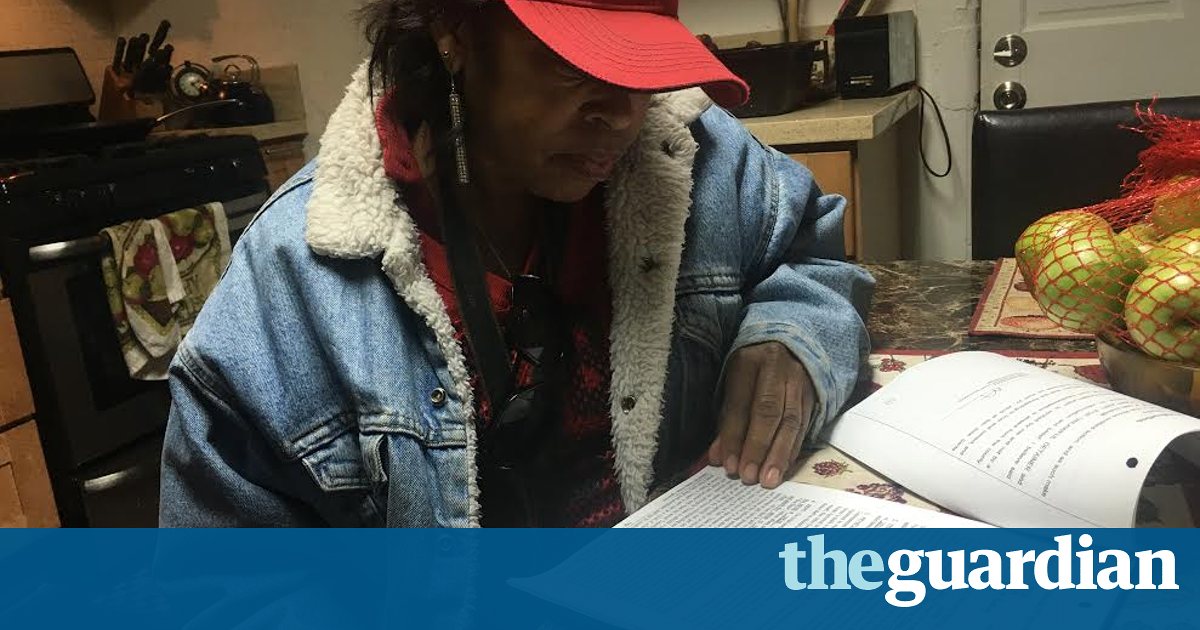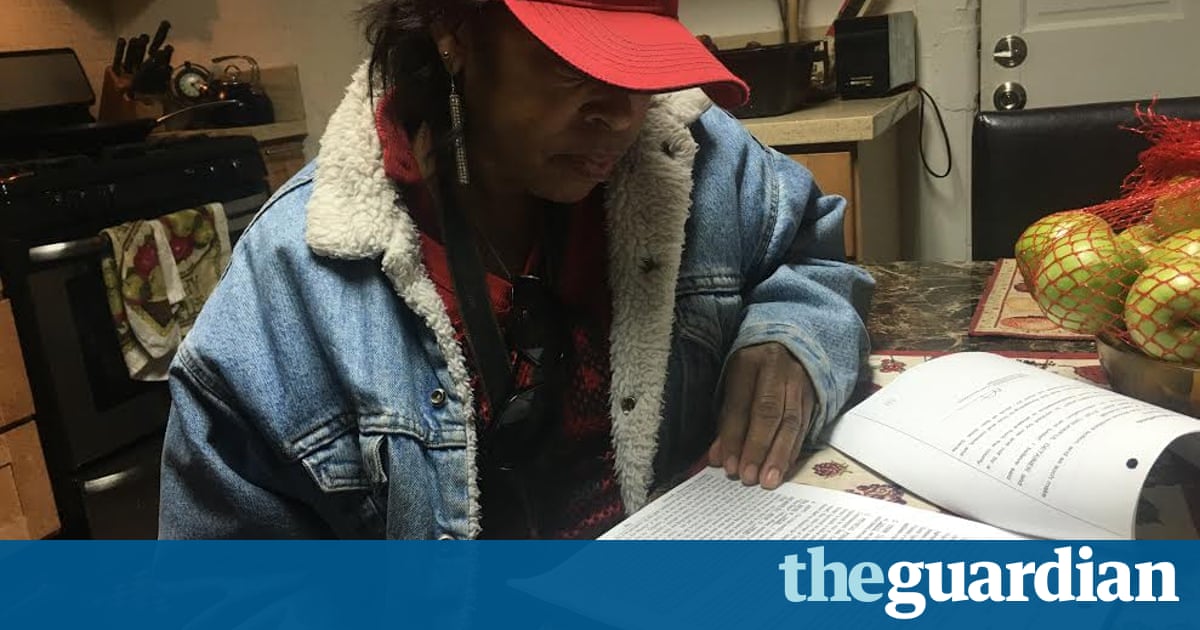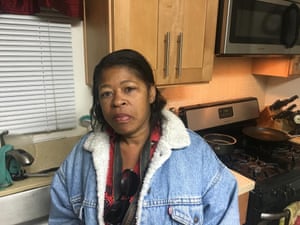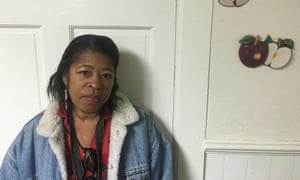Oakland’s ‘mega-evictor’, the landlord who filed over 3,000 eviction notices

Pro-tenant group says a landlord who has a seat on Oaklands housing cabinet is also the top evictor in the city, where a housing crunch has reached crisis levels

Leketha Williams was out of options. When the Oakland, California, mother was evicted and became homeless in May of 2010, she had just enough money to book a hotel for her and her two sons, then aged seven and 12.
In the following weeks, she worked to get her children to school on time each morning before carrying all of their belongings from one temporary home to the next, often forced to make dinners for the family out of hotel microwaves.
Williams had fallen behind on rent during a difficult financial period and had begged her landlords for mercy, writing in one handwritten letter: Please let us stay for at least a week because my boys do not have anywhere to go Do it for the sake of my boys.
But records show the sheriff ultimatelyforced her to surrender her apartment.
It was horrible, Williams, 47, recalled in a recent interview. I was very shocked They didnt give us no time.
Its possible that Williamss story could have turned out differently had she not lived in a building managed by William Rosetti. A review of public records by the Anti-Eviction Mapping Project, a pro-tenant group, suggests that the Bay Area real estate executive, through his expansive portfolio of property companies and investments, is Oaklands number one mega-evictor.
The organizations research and an analysis by the Guardian reveal that in Oakland, Rosetti and his business firms have filed more than 3,000 eviction notices, which are the first step in removing a tenant. The data, along with accounts from evicted tenants, paint a picture of painful displacement and rising income inequality in Oakland, a city that is rapidly gentrifying amid the tech boom of nearby San Francisco and Silicon Valley.
These evictions and the rent increases are part of an ecosystem thats leading to a massive demographic shift of who can live in Oakland, said Erin McElroy, co-founder of the mapping project and co-author of a new report on displacement in the region.
Evictions arent the only way Rosetti may be having an impact on Oakland. The researchers were particularly shocked to discover that the apparent top evictor has a seat on Mayor Libby Schaafs housing cabinet, a body dedicated to promoting equity and affordable housing in an increasingly unaffordable city.
I watched the gentrification
Williamss story is a familiar one in the Bay Area, where black residents have been displaced at alarming rates. By many measures, the housing crunch has reached crisis levels in Oakland, which has been deeply burdened by the migration out of San Francisco, the city across the bay known to have the priciest real estate in the country.

I actually watched the gentrification, said Mario Benton, 51, who lived in one of Rosettis buildings for more than 15 years and said there werent many black residents left when he moved out a few years ago.
Oakland now has one of the fastest-rising rents in the US and the countrys fourth most expensive rental market, with a median rent of $2,280 a month for a one-bedroom.
As some of the worlds largest technology corporations continue to prosper in Silicon Valley, making the region unaffordable to many and leading to mass evictions, activists have grown increasingly worried about the negative effect of tech in Oakland, where Uber is planning a major office development.
While Oakland rents have nearly doubled from 2011, the median income of residents has increased by only 11%, leading some to suggest that it has the worst affordability crisis of any major US city.
The Anti-Eviction Mapping Project, which studies Bay Area displacement, collected data from the local rent board and found that landlords have filed about 50,000 eviction notices since 2008 (though the city failed to provide data for 2009 and 2010).
The statistics largely refer to three-day notices to pay or quit, the first step in an eviction when a tenant misses a payment, and the cases generally cover buildings protected by rent control, meaning older properties where landlords are limited in how they can raise the rent.
The group also uncovered that dozens of the obscure limited liability corporations (LLCs) listed on the documents traced back to thousands of Rosettis units, with properties scattered across the city. The Guardian was able to confirm that more than 3,000 notices included in the rent board database were tied to his companies.
Rosetti told the Guardian that he has been in the business for 40 years and that his companies currently have a total of roughly 1,200 units, mostly in Oakland.
On one of his websites, he touts his work in San Francisco in the 1970s and 1980s, saying he was at the forefront of the condominium conversion business, a process that removes rentals from the housing stock and can lead to large-scale displacement of tenants.
For some Oakland renters evicted by Rosetti, the consequences were devastating.
It does something to you mentally
Terry Braggs said that when he lost a restaurant job in 2011, the management at his Rosetti building refused to negotiate with him.
I remember saying, Im really good for it, I just need a little bit more time. I lost my job, the 33-year-old chef said in an interview.
But his landlords moved forward with an eviction, andBraggs said he had to leave Oakland and move back in with his parents 30 miles away from the Bay Area restaurant scene where he was trying to build his career.

It was overall stress and a little bit of depression, he said. Being evicted and forced to leave a place where you live, it does something to you mentally.
Braggs said it also has been an ongoing battle to secure housing now that he has an eviction on his record. Owners see that and its like youve got a disease It is an extremely hard process to get back on your feet.
Sascha Illyvich, a Rosetti tenant who faced two eviction lawsuits for missed rent payments, said he felt targeted since he and his girlfriend at the time frequently spoke up about maintenance issues and other problems. During the second case, he said they decided to leave. They were trying to do anything to get us out They didnt like the fact that we complained and knew our rights.
Williams, the mother who became homeless in 2010, said the eviction trapped her in a cycle of financial hardship. Paying nightly fees for hotels, she couldnt save enough money for a deposit on a new apartment, and the many challenges of homelessness made it impossible for her to have a steady job.
We had to start all over again, she said.
Todd Rothbard, Rosettis attorney who handled the three cases, said management was patient with those tenants, gave them opportunities to pay owed rent and granted their requests for additional time before they were forced to move out.
In Williamss case, Rosetti claimed the mother was given multiple warnings and had missed several rent payments, though court filings show she was only behind by one month when his company moved to evict her.
Its difficult to know how many of Rosettis eviction cases end in displacement. The mapping project also analyzed court records and found that over the past 10 years, Rosetti has been associated with hundreds of eviction lawsuits (the next step after filing a notice).
Many of the thousands of rent board notices from Rosetti may not have resulted in formal eviction cases in court. But activists note that in general there are numerous ways in which tenants are pushed out without lawsuits.
Some may leave when they get a notice in an effort to avoid having an eviction on their record, some may not know their rights, and some may face harassment from managers, advocates said.
Pretty much industry standard
Rosetti and his lawyer strongly disputed allegations that he is a major evictor, arguing that the three-day notices are standard filings when tenants fall behind, and that his companies work with tenants to help them stay. Indeed, the Guardian interviewed several of his tenants who were given second chances after missing a payment.

We dont evict unless its somebody who is absolutely egregious, Rosetti said, adding in a later email. An eviction is a major tragedy in anyones life and when a resident loses the ability to earn or provide sufficient money for shelter it is a societal failure.
Presented with specific documentation on the number of notices, Rosetti said he could not comment on the veracity of the data.
He also claimed that he gives tenants many chances to pay debts, which is why he might have a high number of individual notices, and further noted that he filed a much higher rate of eviction lawsuits during the foreclosure crisis 10 years ago. This year, he said, he has had fewer than 20 cases.
Rothbard argued that the eviction numbers are simply a result of Rosettis large volume of units and claimed that many of the buildings have marginal tenants who struggle to keep up.
Its pretty much industry standard, he said. The fact that hes had to serve that many notices shows you the quality of tenants hes dealing with.
Mayor Schaaf said in an interview that Rosetti has not influenced any specific policies while on her housing cabinet and said it was useful to have executives such as him involved in a group that brings together developers and housing activists.
He is certainly the type of person we would want to influence, she said. If he is in fact the largest evictor he is exactly the kind of person you want in the room.
Finding ways to stem the tide of displacement is her top priority, Schaaf added. Im concerned with the total number of evictions, period It is horrific and it is damaging to this community.
Rosetti argued that the solution to Oaklands housing crisis was to build more housing and raise the wages of low-income and middle-class people.
Housing is the number one crisis in Oakland, he said.What we all need to do is work together to create more affordable housing for everybody.